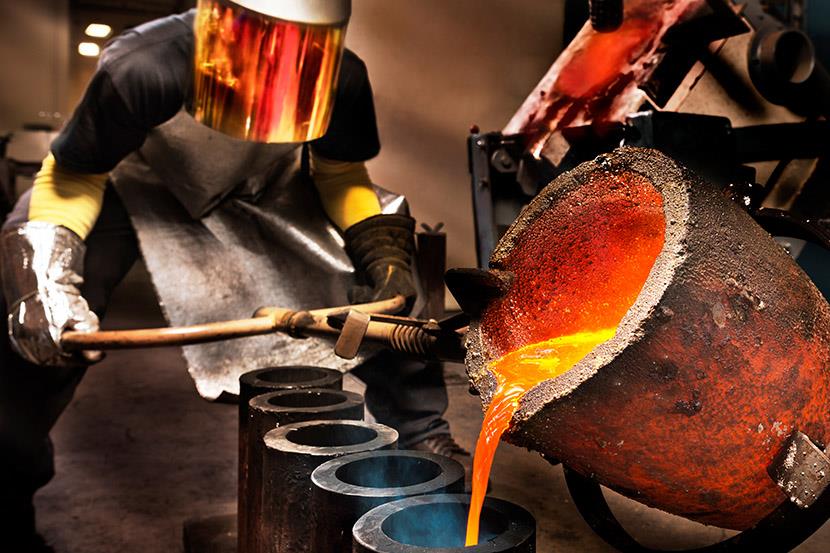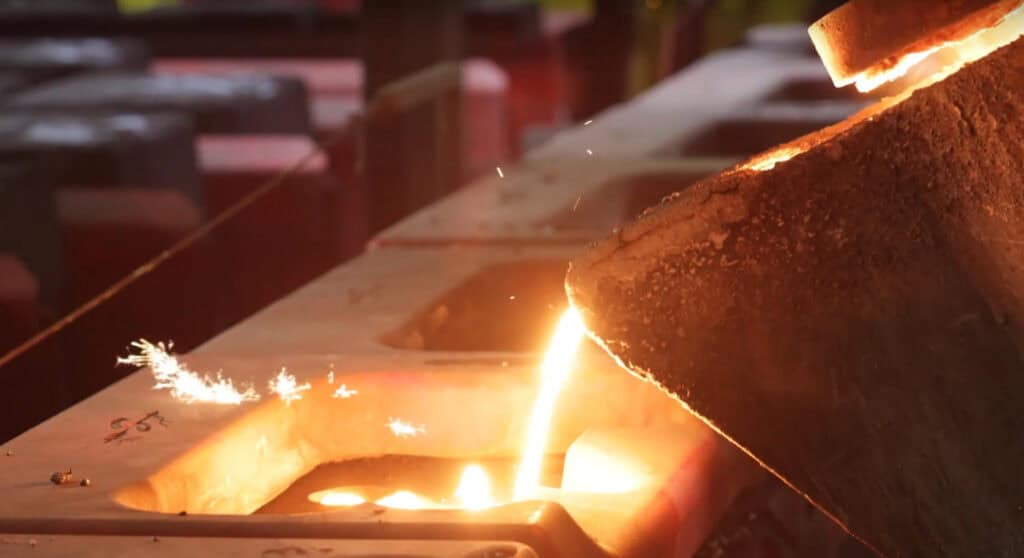Key strengths of choosing a professional Aluminum Foundry for your next project
Wiki Article
How a Metal Foundry Contributes to Lasting Metal Production Practices
Metal foundries play a necessary duty in advertising sustainability within the metal manufacturing industry. By incorporating recycled products, they lower reliance on virgin sources and lessen ecological influences. Energy-efficient melting processes additionally decrease energy usage and exhausts. The journey towards lasting practices entails even more than simply reusing and power administration. It encompasses a wider dedication to moral sourcing and innovative modern technologies. The ramifications of these methods are considerable and warrant better exam.The Duty of Recycling in Metal Foundries
While metal production has actually traditionally depended on virgin materials, the enhancing focus on sustainability has actually brought about a substantial shift in techniques, specifically in metal foundries. Recycling has emerged as an important part of this change, permitting foundries to repurpose scrap metal and reduce reliance on mined resources. By integrating recycled products right into their processes, foundries not only lower environmental influence yet also reduced production expenses.Using recycled metals, such as copper, aluminum, and steel, decreases power usage and reduces greenhouse gas exhausts related to conventional mining and refining methods. Foundries can attain high-quality outputs by utilizing innovative sorting and processing modern technologies to ensure the pureness of recycled products. This emphasis on reusing fosters a round economy, where waste is decreased, and sources are used effectively. Subsequently, metal foundries play a crucial duty in advertising lasting methods within the metal production market.
Energy-Efficient Melting Methods
Energy-efficient melting strategies are necessary for improving sustainability in metal production. These methods considerably decrease power usage throughout the melting procedure, which is one of one of the most energy-intensive stages in metal manufacturing. Technologies such as induction melting, resistance heating, and microwave melting deal enhanced performance compared to conventional methods. Induction melting, as an example, uses electro-magnetic fields to generate heat straight within the metal, decreasing energy loss and offering accurate temperature level control.In addition, carrying out heat healing systems can better enhance effectiveness by reusing and recording waste heat produced during melting. Employing advanced insulation materials and maximizing heater designs additionally add to power savings. By embracing these innovative melting strategies, metal foundries can reduce their carbon impact, decrease operational expenses, and contribute to a much more lasting production landscape. The combination of energy-efficient techniques not just straightens with environmental objectives however likewise meets the expanding need for liable production techniques in the metal industry.
Lasting Sourcing of Raw Products
Sustainable sourcing of basic materials is crucial for lessening the ecological influence of metal manufacturing. This includes the boosted usage of recycled steels, the adoption of ethical mining methods, and initiatives aimed at local sourcing. By focusing on these methods, the sector can promote liable resource monitoring and assistance regional economic climates.
Recycled Metal Application
Exactly how can markets effectively lower their environmental effect while meeting the growing need for metal? One considerable technique is the use of recycled metal. By incorporating scrap metal right into their manufacturing processes, foundries can decrease the extraction of virgin products, thus preserving all-natural resources and minimizing energy usage. Recycled steels need much less power to procedure compared to their raw equivalents, bring about lower greenhouse gas emissions. In addition, the use of recycled metal assists draw away waste from landfills, advertising a circular economic climate. Industries that prioritize recycled metal not just add to sustainability yet additionally advantage from expense financial savings connected with lowered product purchase. Recycled metal usage stands as a necessary approach for eco responsible metal manufacturing.Ethical Mining Practices
While the need for metals continues to climb, markets are increasingly acknowledging the importance of honest mining practices in making certain responsible sourcing of resources. Ethical mining encompasses a commitment to environmental stewardship, social responsibility, and adherence to reasonable labor practices. Firms are now prioritizing partnerships with mines that show openness in their procedures, minimizing ecological influence and respecting local communities. This method not just cultivates a sustainable supply chain yet additionally improves the reputation of services involved. By applying rigorous requirements and qualifications, industries can deal with unlawful mining activities and promote the welfare of employees. Ultimately, ethical mining practices add substantially to a more sustainable metal production environment, lining up economic growth with ecological and social integrity.Local Sourcing Efforts

Technologies in Metal Casting Procedures
Innovations in metal casting processes are changing the sector by integrating sophisticated recycling methods that decrease waste. Energy-efficient melting techniques are additionally being developed to lower power consumption throughout manufacturing. In addition, using cutting-edge mold and mildew products contributes to improved performance and sustainability in casting procedures.Advanced Recycling Techniques
Advanced recycling strategies are transforming metal casting procedures, considerably boosting sustainability in the industry. These advancements concentrate on recycling and redeeming scrap metal, significantly lowering waste and the requirement for virgin products. Techniques such as hydrometallurgy and pyrometallurgy allow foundries to extract valuable metals from made use of elements, ensuring reliable source use. Furthermore, progressed sorting and purification modern technologies enhance the top quality of recycled steels, making them suitable for high-performance applications. This not only decreases the ecological footprint of metal production but likewise fosters a round economy by advertising the reuse of products. As these recycling methods remain to develop, they assure to additionally streamline procedures within foundries and add to a much more lasting metal production landscape.Energy-Efficient Melting Techniques
While traditional melting methods have long been the backbone of metal casting, current developments have actually introduced energy-efficient strategies that considerably reduce energy intake and exhausts. Technologies such as induction melting and electrical arc Aluminum Foundry heating systems have actually acquired prestige, permitting exact control over temperature level and reducing the requirement for nonrenewable fuel sources. These techniques not only improve energy efficiency yet also promote faster melting times, which converts to decrease operational expenses. In addition, advancements in warm recovery systems allow foundries to capture and recycle excess heat produced throughout the melting procedure. This holistic method to power monitoring not only supports lasting practices but additionally settings metal foundries as leaders in the shift in the direction of greener production processes, even more lining up with international sustainability goals.Cutting-edge Mold Products
As the need for even more effective and lasting metal casting processes expands, the exploration of innovative mold products has actually become a centerpiece in the sector. Standard mold products usually contribute to ecological challenges, triggering the search for options that lower waste and power consumption. Recent developments include the growth of recyclable composites and biodegradable binders, which not just enhance mold and mildew efficiency but likewise lessen ecological influence. In addition, the usage of 3D printing technology in mold and mildew production enables for complex designs that lower product usage and make it possible for quick prototyping. These innovative products not only boost casting precision yet likewise align with sustainability objectives, showcasing the sector's dedication to lowering its carbon footprint while preserving premium production standards.Decreasing Waste Through Advanced Modern Technology
Ingenious innovations are changing the metal production sector by considerably lowering waste and enhancing effectiveness. Advanced data analytics and equipment understanding formulas allow foundries to optimize manufacturing procedures, reducing and identifying inefficiencies scrap product. Smart sensing units keep track of tools performance in real-time, enabling for anticipating upkeep that lowers downtime and waste generation. Furthermore, additive manufacturing strategies, such as 3D printing, permit for the development of facility components with minimal product usage, noticeably reducing waste contrasted to standard approaches.
Closed-loop systems are becoming a lot more prevalent, wherein scrap metal and byproducts are recycled back right into the manufacturing cycle, guaranteeing that materials are made use of to their greatest capacity. This assimilation of modern technology not just promotes resource conservation yet additionally improves the total sustainability of metal production methods. By embracing these advancements, foundries can contribute to a much more lasting future while preserving competition in the marketplace
The Influence of Foundries on Carbon Footprint Reduction
Foundries play an important role in minimizing the carbon impact of the metal manufacturing industry by executing various lasting methods. By using energy-efficient modern technologies, such as electric arc heaters, these facilities significantly lower greenhouse gas emissions compared to standard approaches. In addition, foundries progressively embrace sustainable energy sources, which additionally diminishes their dependence on nonrenewable fuel sources.Reusing scrap metal is an additional important practice that foundries employ, conserving resources and decreasing the need for virgin products. This not just minimizes waste but also minimizes the energy-intensive extraction processes connected with mining. In addition, the fostering of closed-loop water supply assists to lessen water use and lower wastewater discharge, contributing to a more lasting operation.
With these initiatives, foundries demonstrate their commitment to ecological stewardship, causing a significant decrease in the total carbon impact of the metal manufacturing market. Their ongoing efforts are critical in the change towards a much more lasting industrial landscape.
Regularly Asked Inquiries
What Sorts of Metals Are A Lot Of Frequently Recycled in Foundries?
Light weight aluminum, steel, copper, and brass are amongst the most frequently recycled steels in foundries. These metals are favored because of their high recycling rates, financial worth, and prevalent accessibility, contributing greatly to industrial sustainability initiatives.Exactly How Do Foundries Ensure the High Quality of Recycled Materials?
Foundries ascertain the top quality of recycled materials with strenuous screening, arranging, and filtration processes. They implement sophisticated technologies to examine composition and remove pollutants, ensuring that the recycled metals fulfill sector standards for performance and security.
What Accreditations Exist for Lasting Foundry Practices?
Numerous qualifications exist for lasting foundry practices, consisting of ISO 14001 for environmental monitoring, ISO 50001 for power management, and LEED certification for sustainable building practices (Aluminum Casting). These certifications aid guarantee adherence to environmental and sustainability standards in operationsHow Do Foundries Determine Their Carbon Impact Reduction?
Foundries determine carbon impact decrease with devices like lifecycle analyses, energy audits, and discharges tracking systems. They compare baseline discharges to present outcomes, examining enhancements in energy effectiveness, material use, and eco-friendly energy adoption over time.What Are the Financial Advantages of Sustainable Metal Manufacturing?
Lasting metal production supplies financial benefits such as reduced functional prices, increased efficiency, enhanced market competitiveness, and possible federal government motivations. Additionally, it promotes advancement and draws in eco aware customers, ultimately driving long-lasting profitability for organizations.Metal foundries play an important function in advertising sustainability within the metal manufacturing sector. While metal manufacturing has actually traditionally relied on virgin products, the enhancing emphasis on sustainability has led to a considerable change in methods, specifically in metal foundries. By integrating scrap metal into their manufacturing processes, foundries can decrease the extraction of virgin products, thus saving natural sources and reducing energy intake. Foundries play an important function in decreasing the carbon impact of the metal manufacturing industry by implementing various lasting practices. Reusing scrap metal is an additional critical method that foundries employ, preserving sources and minimizing the need for virgin materials.
Report this wiki page